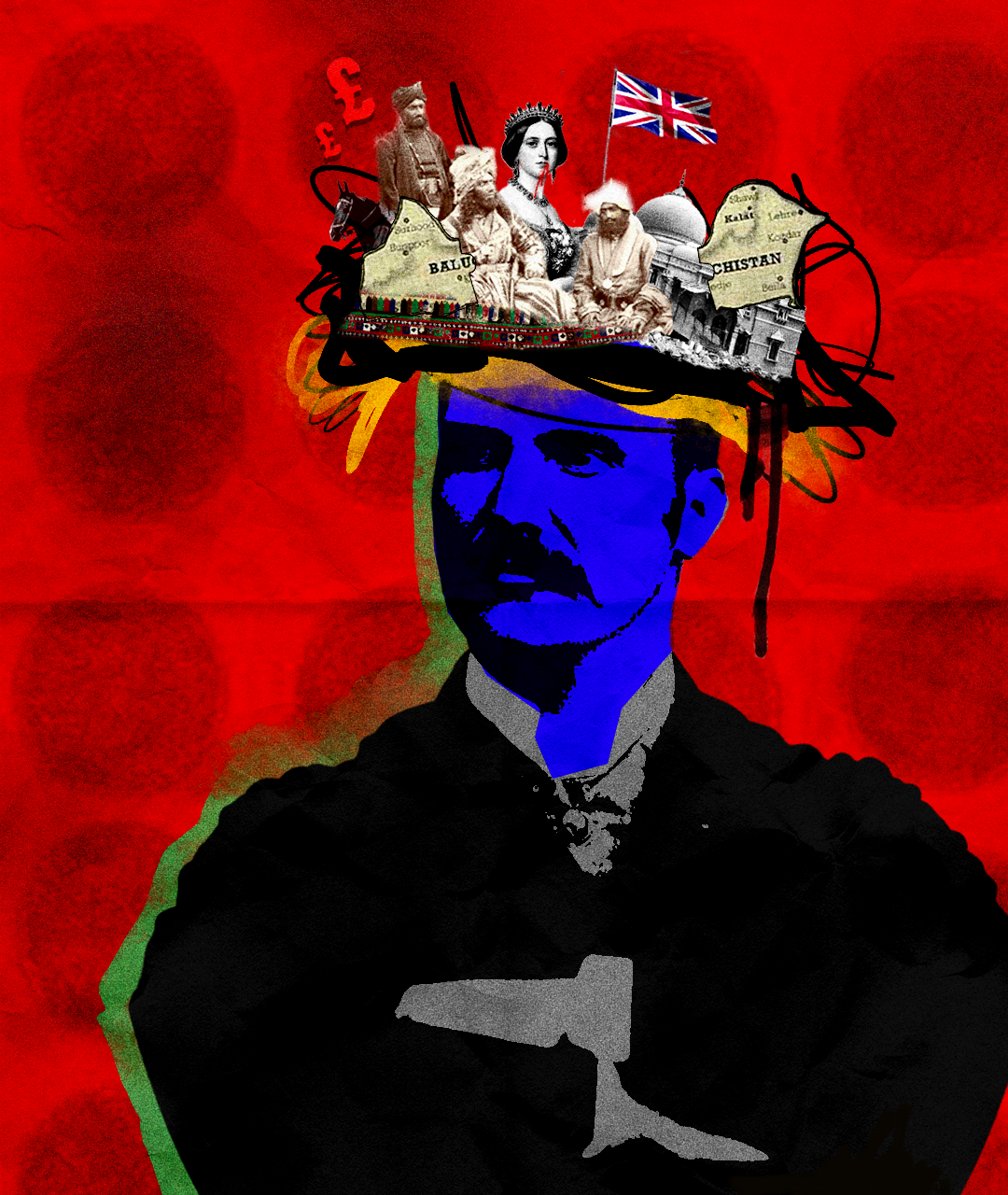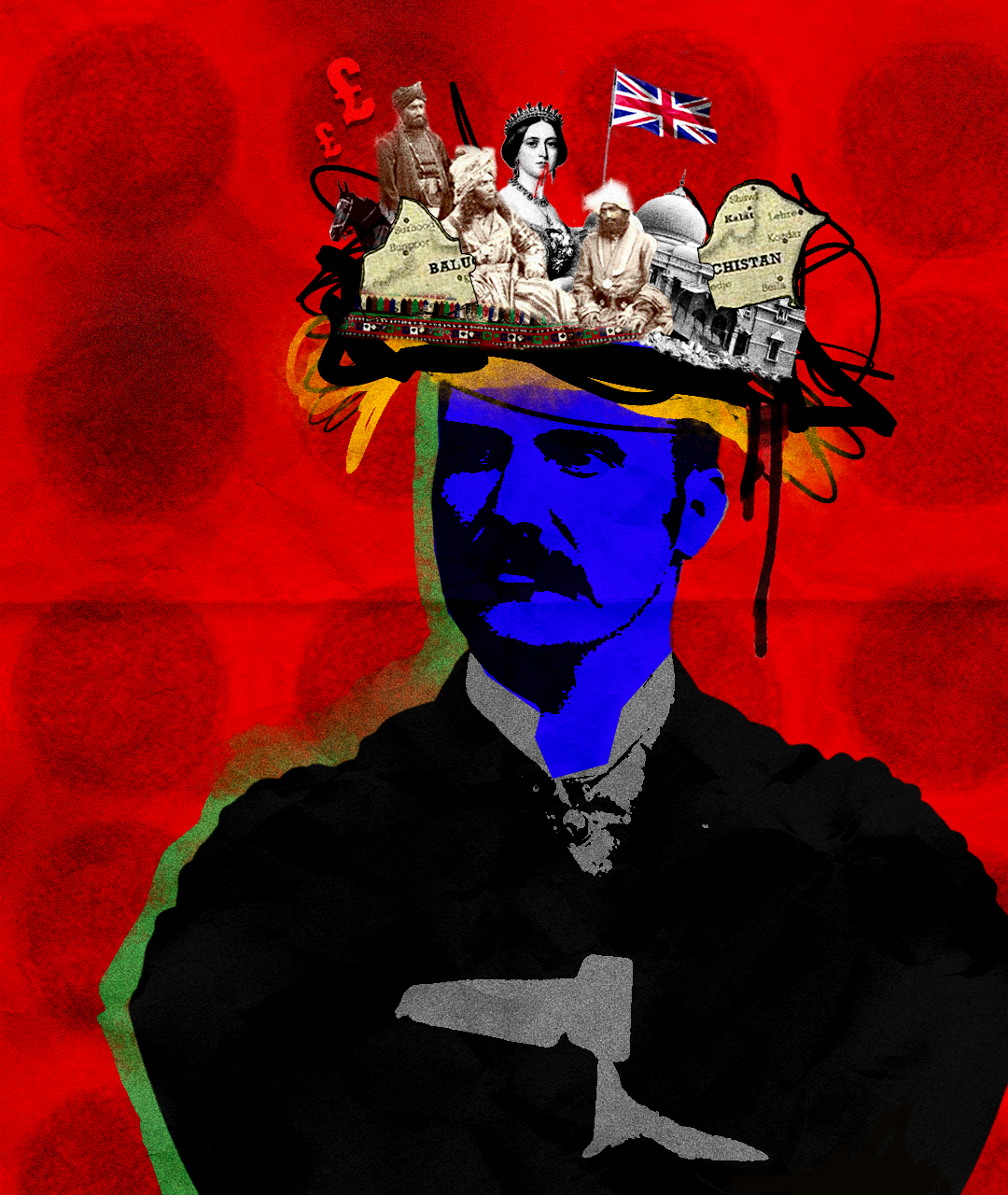
By Akbar Notezai

Graphic by Hamza Saqib and Ayesha Rahmi
Sir Robert Groves Sandeman was a British military officer, first appointed in 1866 as deputy commissioner of Dera Ghazi Khan and later as political agent to the governor-general in Balochistan in 1877. He served in his latter position till his death in 1892. Bela, a populous town on the N-25 highway in central Balochistan’s Lasbela District, is where he lies buried.
Sandeman is regarded as the architect of colonial policy on Baloch tribes living at the outskirts of British India.
It takes 10 hours to drive from Quetta to Bela. Visiting Sandeman’s tomb in a garden in Bela, not far from another green patch where children were playing cricket, I got the chance to converse with one of the children.
“A long time ago, an Englishman fell off a plane here, and they buried him: that is why his tomb is in this garden,” Zubair Baloch told me innocently.
Sandeman was not paradropped on to Balochistan. He instead crept over the political landscape of the vast Baloch lands from across its borders with Punjab as part of a well-orchestrated colonial strategy. He changed Baloch politics forever. His footprints can still be found over day-to-day politics of the province.
He introduced what is now known as the sardari system. His machinations severed the traditional relationship between the nominal sardar and the Baloch tribesmen and entrenched the sardar in his area as an all-powerful ally of the British sarkar. Baloch politics since then have become a corollary to the sardar-sarkar nexus.
“Before Sandeman, a system of tribal confederation existed in Balochistan,” says Jahanzeb Rind, assistant professor at LUMS, who is working on his PhD thesis titled Tribal Structure and State Formation in Colonial Balochistan (1839-1947). “This meant that different tribes under the Khan of Kalat had developed a system in which the tribesmen used to elect a sardar. Interestingly, the sardars were elected from a particular family of the tribe, but all this changed after Sandeman.”
Glimpses of the quasi-democratic and egalitarian nature of relationship between the traditional sardars and the tribesmen can be found in a number of historical accounts.
“When the Marri tumandar (sardar) Guzen Khan came to see Sandeman for the first time along with the headmen of his tribe in 1862, the dress which he wore was not different from the other members of the delegation of his tribe ... Same was the nature of the food of those head men of the tribes,” writes Assistant Professor Faiz Anwar of Islamia University Bahawalpur in his paper on Sandeman System quoting Hatto Ram’s book on the history of Balochistan.
Faiz concluded his paper by writing that the colonial patronage changed the egalitarian nature of tribes into authoritarian ones.
Rafi Ullah Kakar is a political commentator from Balochistan. Talking to Lok Sujag, he comments:
“Sandeman developed a frontier governance system which fortified the position of tribal sardars at the expense of the people of Balochistan. He used local tribal elites for certain administrative functions in their own areas like maintaining law and order and delivering justice. He strengthened the jirga system and introduced the levies forces manned by the sardars and his men. However, the colonial powers retained strategic control over these so-called ‘indigenous’ institutions and used brutal force whenever needed. In return, the sardars were allotted land, titles and other privileges.”
Jahanzeb Rind elaborates further: “Sandeman gave three things to the sardars in Balochistan. One of the first things that he started off with was providing the sardars with an extra income. Second, he gave them lands and third, he created for the sardars a force called levies. So he not only created an economy for sardars but also gave them an organized, armed force. Sardars thus were no longer dependent on their tribesmen for power and legitimacy. The British corrupted the traditional sardari system to ensure that sardars remained dependent on and thus loyal to them.”
Abdul Wahid Khetran holds the sardar-sarkar nexus responsible for the province’s backwardness. He is a Quetta-based researcher who has written extensively on the tribal affairs of his province.
“Greater levels of ignorance often correlate with higher degrees of underdevelopment, which is the case with Balochistan’s tribal parts,” he says. “The sardari system is strong for all the wrong reasons and even in today’s digital era, our tribesmen are deprived of basic civic facilities.”
He points out that the ground realities have changed altogether and the system is completely outdated yet “it is still in place to support the vested interests of powerful elites.”
Dr Shah Mohammad Marri, a Baloch historian and prolific author, holds similar views. Talking to Lok Sujag, he said that the sardari system in Balochistan had become outdated a long time ago.
“It is extinct and it has left a vacuum,” he noted, adding, “consequently, there is anarchy as the middle-class among Baloch that could fill this vacuum has not yet fully emerged.”
“There have hardly been any political and social movements in tribal parts of Balochistan that could challenge the status quo. The tribesmen continue to live under the yoke of the sardari system,” laments Dr Hafeez Jamali, a Quetta-based anthropologist.
“Besides the state, mainstream political parties also depend on sardars to form governments in Balochistan and to gain numbers in the federal government which shows their disinterest in the real people’s politics,” says Mohammad Arif, assistant professor at the University of Balochistan. “This is why Balochistan is always on the receiving end in a negative way.”
There are, however, some signs of change.
The non-tribal part of Balochistan, the Makran region, is currently the epicenter of popular movements demanding equal rights for Baloch. It is, however, slowly spreading to tribal parts.
The recent killing of Balaach Baloch in Turbat, at the hands of the Counter Terrorism Department in the headquarters of Kech district in Makran, sparked a widespread protest movement. As Mahrang Baloch led a protest march from her home town to Islamabad, it was welcomed everywhere in Balochistan including the parts that are considered strongholds of sardars.
The tribal area of Barkhan is a long established territory of Sardar Abdur Rehman Khetran. He gained notoriety last year when dead bodies of two boys and a girl were found from a well in his area. The bodies were said to be of the persons who had been imprisoned by Khetran in his private jail. Sardar Khetran was arrested for triple murder and later released on bail. He is considered an ardent supporter of the military establishment and arch opponent of Baloch protest movements. Yet, hundreds of tribesmen gathered in Rakhni tehsil of Barkhan to welcome and support Mahrang as she and her team of protesters arrived in the area en route to Islamabad.
Baloch women also took out a rally to stand in solidarity with Dr. Mahrang and her sit-in protest in Islamabad in Wadh, the hometown of Mengals, who are influential politicians. The large crowd included a large number of women, who are hardly seen in Wadh’s public spaces.
As people’s voices in Balochistan are getting louder, the sardar-sarkar nexus is under pressure. Abdul Wahid Khetran believes that if the state (sarkar) stops pampering sardars, they will lose their power overnight.
Ironically, Richard Isaac Bruce, a British colonial officer had expressed the same views in his book The Forward Policy and its Results written and published in 1900 - 124 years ago. He wrote:
“It is the sarkar who makes or unmakes these men (sardars) … It is to this policy that they owe the influence they at present possess, and were our support to be withdrawn, their power and authority would soon dwindle away again.”
Akbar Notezai is a journalist.